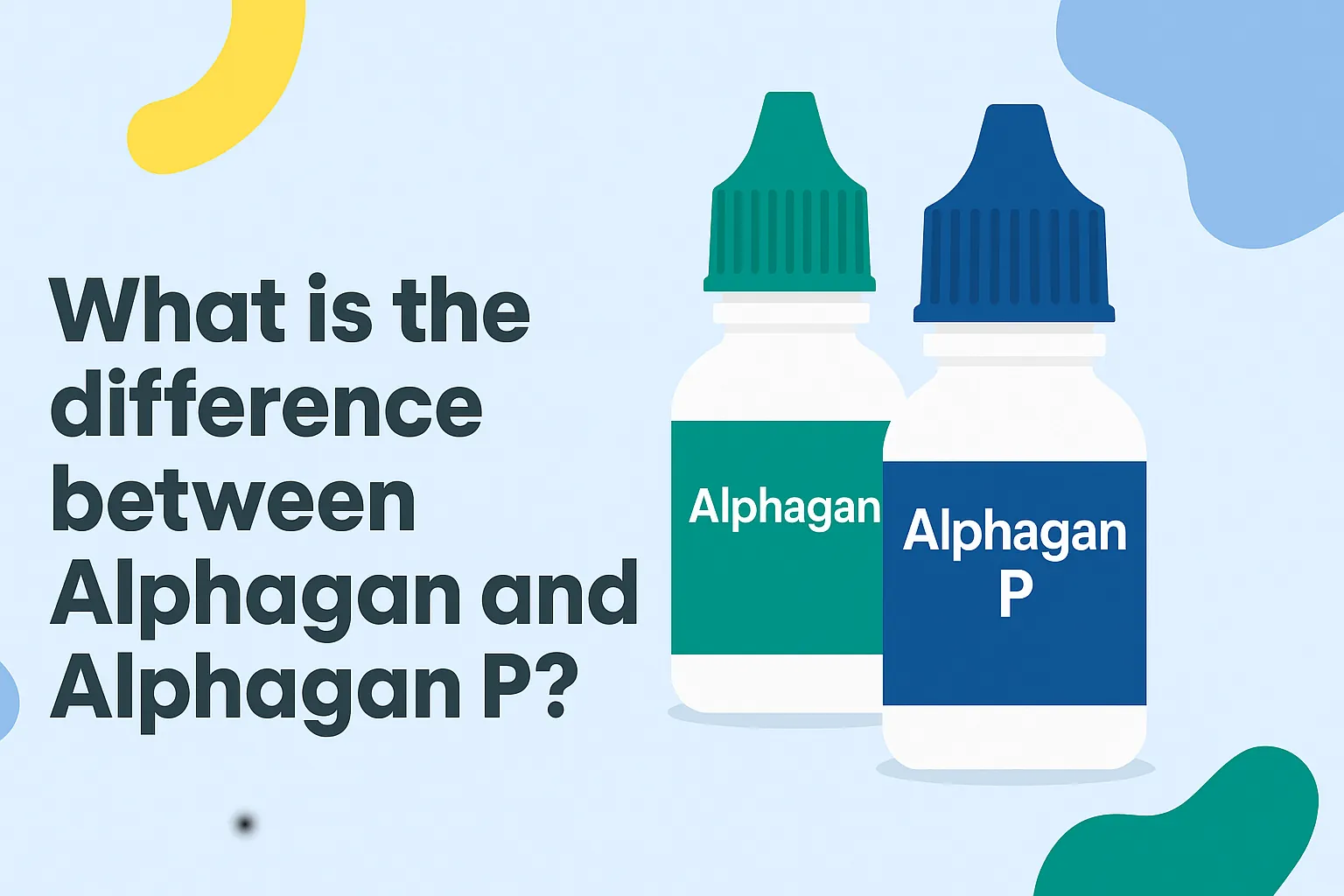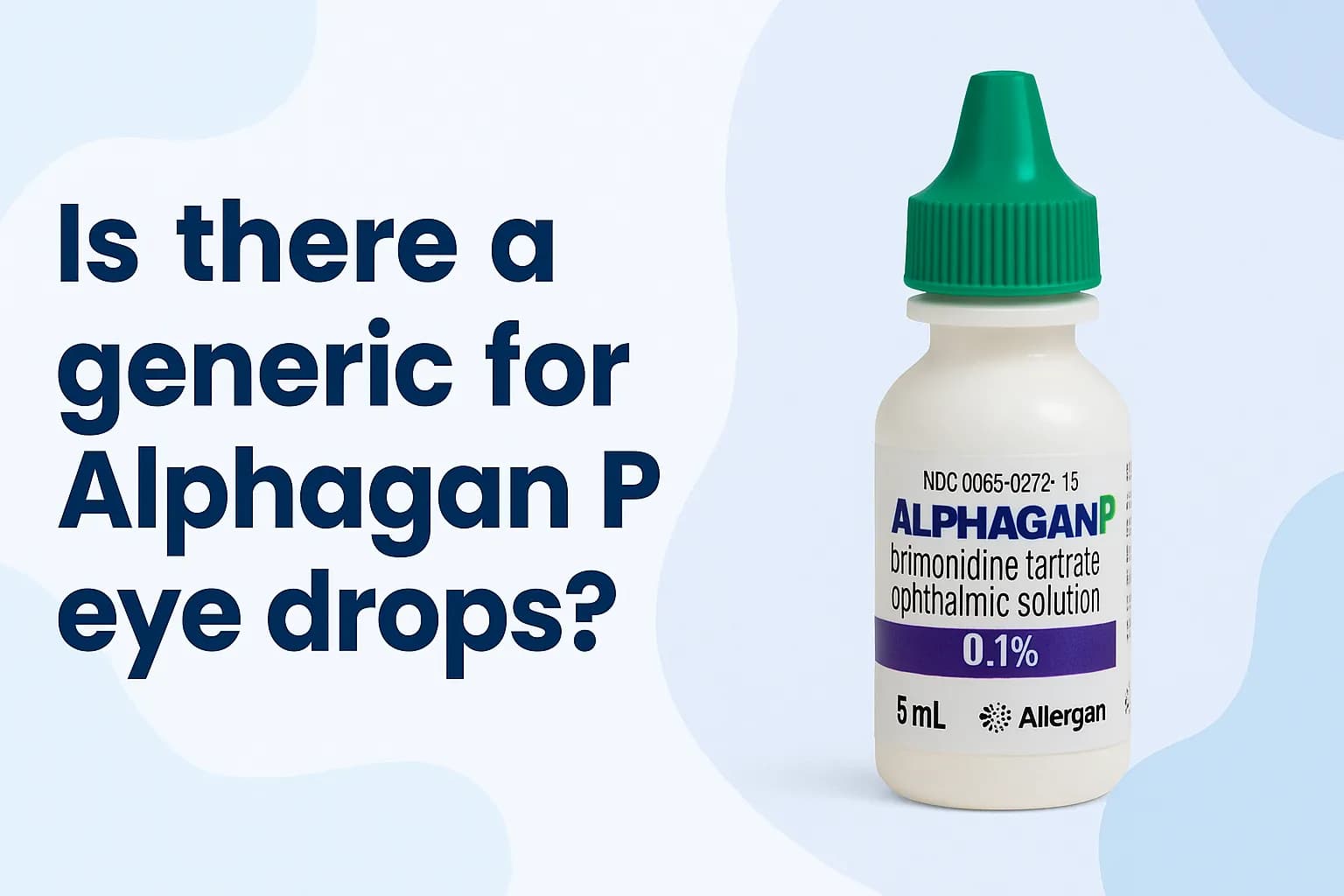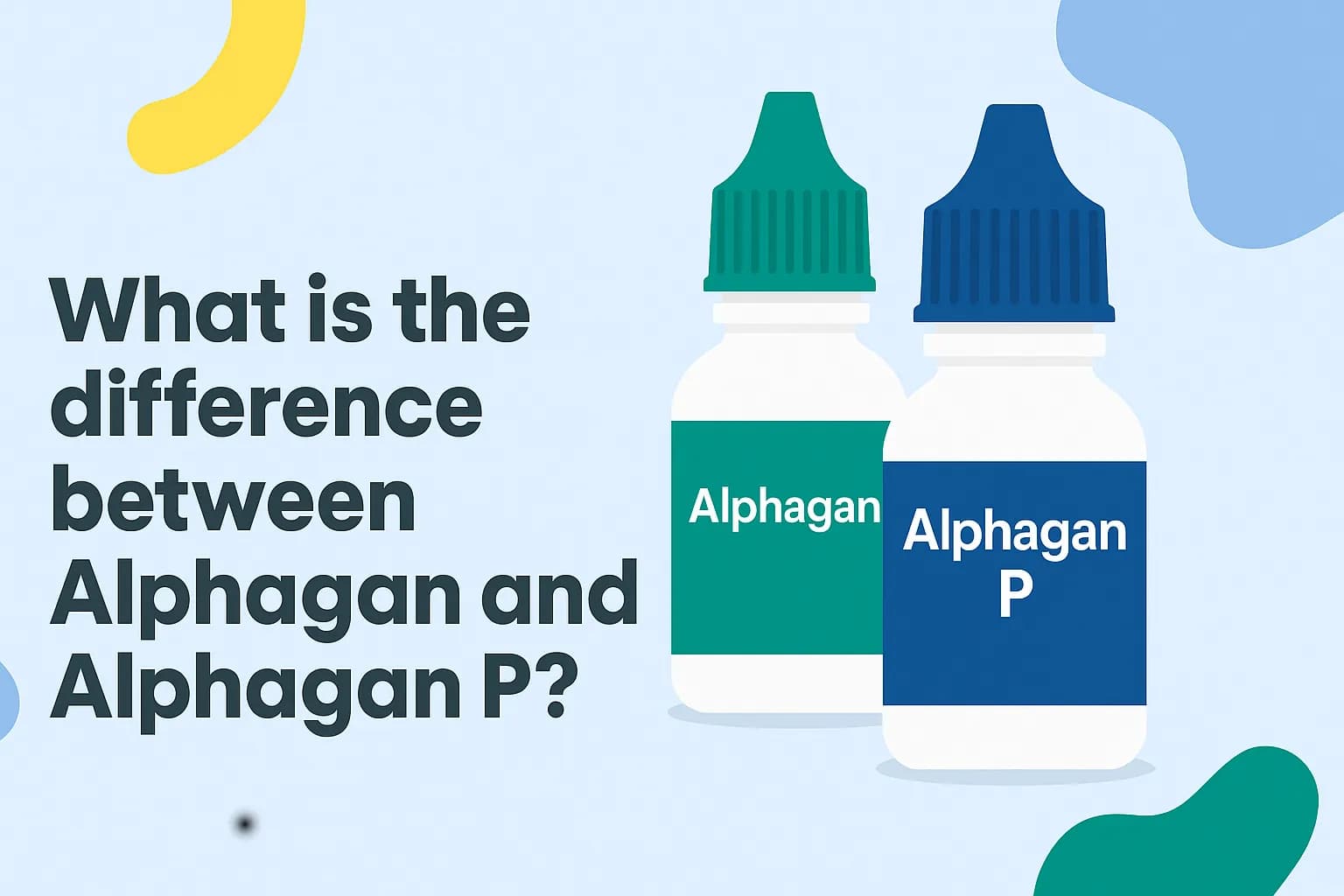What is the difference between Alphagan and Alphagan P?

Allergan, Inc. first gained approval for Alphagan (brimonidine 0.2%) in September 1996 to treat open-angle glaucoma or ocular hypertension. In March 2001, they introduced Alphagan P (brimonidine 0.15%), and then in August 2005 got approval for a lower-strength version of Alphagan P (brimonidine 0.1%) to treat the same conditions.
While they both come in the same dosage form (ophthalmic solution) and contain the same active ingredient (brimonidine), there are a few key differences. The first is the strengths they are available in. Alphagan is available in a 0.2% solution while Alphagan P comes in a 0.1% and 0.15% solution.
Key Differences
The main difference between these 2 medications is the preservative used in each formulation. Alphagan uses the preservative benzalkonium chloride (BAK). BAK is the most common preservative used in topical eye drops. It acts as a detergent to help keep Alphagan free of bacteria. It is an effective antimicrobial agent with broad-spectrum activity against bacteria as well as against fungi and acanthamoeba (a single-celled living organism commonly found in soil, dust, fresh water sources, swimming pools, air conditioning (HVAC) systems, and humidifiers).
BAK is known to be harmful to your cornea (the clear layer in the very front of the eye) and conjunctiva (the membrane that covers the front of the eye and lines the inside of your eyelid). Use of products with BAK can cause eye discomfort, irritation and pain, increased tearing, redness, blurred vision, and the feeling that there is something in your eye. There has been a movement in the pharmaceutical industry to move away from BAK. Newer products are preservative-free or contain other preservatives to help improve safety and tolerability.
Alphagan P is one of these products. It is preserved with Purite, which is a stabilized oxychloro complex. It is a type of oxidative preservative that has small molecules which penetrate cell membranes to kill bacteria. It is effective against many types of bacteria as well as certain fungi. Compared to other preservatives, Purite seems to be much less toxic. Studies have shown it causes less damage to the conjunctiva and cornea than eye drops preserved with BAK. Studies have also shown that Alphagan P was better tolerated than the BAK-preserved Alphagan.
Alphagan and Alphagan P FAQs
What are Alphagan and Alphagan P used to treat?
Alphagan and Alphagan P are brand-name brimonidine tartrate ophthalmic solutions that are FDA-approved to decrease elevated intraocular pressure (IOP) in patients 2 years of age and older with open-angle glaucoma or ocular hypertension.
How do these medications work?
Alphagan and Alphagan P both contain the active ingredient, brimonidine tartrate. It belongs to a drug class called alpha-2 adrenergic agonists. It works by decreasing your body’s production of fluid in your eye and increasing the flow of this fluid out of your eye, resulting in a decrease in eye pressure.
How often do you take Alphagan and Alphagan P?
It is important to follow your healthcare provider’s instructions on how to use these medications correctly. The usual recommended dosage is to place 1 drop in the affected eye(s) three times daily about 8 hours apart.
What are the side effects of Alphagan and Alphagan P?
While these medications are generally well-tolerated, like any medication, they can cause side effects. Because they contain the same active ingredient, there is not much difference in the incidence of side effects between Alphagan and Alphagan P. The most common side effects of these medications seen in clinical trials include:
- Oral dryness (dry mouth)
- Allergic conjunctivitis or conjunctival hyperemia (red eye)
- Eye irritation, burning, and stinging
- Eye pain
- Headache
- Blurred vision
- Feeling like there’s something in your eye
- Drowsiness or tiredness
- Small white patches on the inside of your eyelids
- Itchy eyes
- Eye dryness
Other side effects seen with these medications include:
- Color change to or thinning of your cornea
- Light sensitivity
- Tearing
- Flu-like symptoms
- Dizziness
- Eyelid inflammation
- Eye discharge
- Upset stomach
- Weakness
- Pale or white eyelids
- Visual disturbance
- Muscle pain
- Slow, fast, or irregular heartbeat
Serious Side Effects
While less common, some individuals may experience serious side effects while using Alphagan and Alphagan P. These side effects may require immediate medical attention. If you experience any of the following, contact your healthcare provider or seek emergency medical assistance:
Shop Medications
- Serious allergic reactions, which can be life-threatening. Symptoms can include:
- Hives
- Trouble breathing
- Swelling of your mouth, throat, and tongue
- Low blood pressure, especially upon standing (orthostatic hypotension)
Alphagan and Alphagan P should be used with caution if you have severe cardiovascular disease, blood vessel problems (thromboangiitis obliterans), Raynaud’s phenomenon, or low blood flow to your heart or brain.
Increased risk of infections from contamination
Alphagan and Alphagan P can cause bacterial keratitis, a bacterial infection of the cornea (the protective covering on the front of your eye) if the dropper gets contaminated. It is important to wash your hands before each use and be careful not to touch the tip of the dropper with your eye, hands, or any other surface.
Damage to soft contact lenses
The preservative in Alphagan, benzalkonium chloride, can be absorbed by soft contact lenses and cause damage. If you wear soft contacts, remove them before using Alphagan or Alphagan P. You should wait at least 15 minutes after using either of these medications before putting your contacts back in.
These are not all of the possible side effects of Alphagan or Alphagan P. You should always seek medical advice from your healthcare provider for any questions or concerns about your medical condition or treatment. Read all patient information, medication guides, or drug information sheets that come with these medications. You can also report adverse events to the FDA at www.fda.gov/medwatch or 1-800-FDA-1088.
What drugs interact with Alphagan and Alphagan P?
Alphagan and Alphagan P may interact with other medications, supplements, or foods, potentially affecting their effectiveness or increasing the risk of side effects. It is important to inform your healthcare professional about all the medications, including prescription medications, over-the-counter drugs, vitamins, and supplements you are taking, including:
- Use with blood pressure-lowering medications such as clonidine and cardiac glycosides such as digoxin may cause a significant drop in your blood pressure.
- Use with beta-blockers such as atenolol, betaxolol eye drops or timolol eye drops can also increase your risk of low blood pressure.
- Use with CNS depressants (alcohol, barbiturates, opiates, or sedatives) may cause increased drowsiness.
- Use with tricyclic antidepressants (TCAs) such as amitriptyline may decrease the effectiveness of these medications.
- Use with monoamine oxidase inhibitors (MAOIs) such as selegiline and tranylcypromine may result in low blood pressure.
What are the contraindications for Alphagan and Alphagan P?
Alphagan and Alphagan P should not be used if you have a known allergy to brimonidine or any inactive ingredients in its formulation.
You should also make sure your healthcare provider is aware of your medical conditions before you start taking these medications, including:
- Depression
- Orthostatic hypotension
- Raynaud’s phenomenon
- Thromboangiitis obliterans (blood vessel disease)
- Severe heart disease
- Have a scheduled glaucoma surgery
- Are taking other antiglaucoma medications, including prostaglandin analogs, beta blockers, alpha agonists, or carbonic anhydrase inhibitors
- Pregnant or plan on becoming pregnant; Alphagan or Alphagan P should be used during pregnancy only if the potential benefit to the mother justifies the potential risk to the fetus.
- Are breastfeeding or plan to breastfeed; Alphagan or Alphagan P should be used during lactation only if the potential benefit to the mother justifies the potential risk to the fetus.
Is there a generic for Alphagan P eye drops?
Yes, Alphagan P and Alphagan are both available as generic medications. You may be able to save money by getting the generic version of these medications.
Is Alphagan discontinued?
Yes, because doctors and patients both preferred Alphagan P, Allergan discontinued U.S. distribution of its older formulation, Alphagan in 2002. This was mainly due to lower rates of certain side effects. However, Alphagan is still available as a generic.
Related medications
- Trusopt (dorzolamide)
- Betoptic (betaxolol)
- Timoptic (timolol)
- Cosopt PF (dorzolamide/timolol)
- Combigan (brimonidine/timolol)
- Lumigan (bimatoprost)
- Xalatan (latanoprost)
- Xalacom (latanoprost/timolol)
- Rocklatan (netarsudil/latanoprost)





